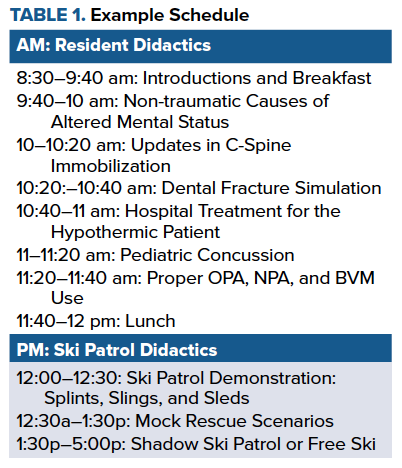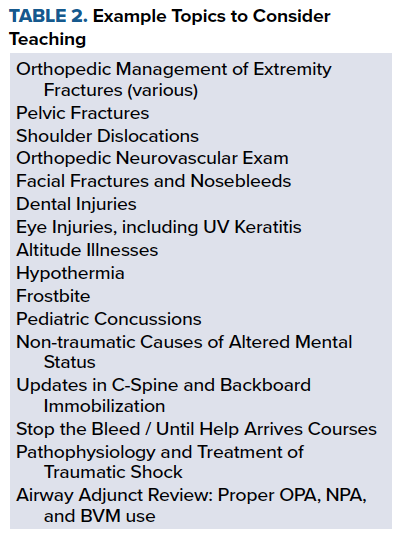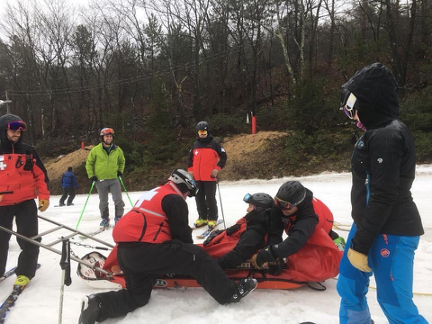Pre-hospital groups like ski patrol provide a great opportunity for EM residents to lead cross-educational training days - while becoming more prepared themselves.
The ED acts as a linchpin between hospital-based care and pre-hospital providers. Environmental emergencies and pre-hospital care are part of core teaching for emergency medicine residents and while many residency programs provide experience with EMS, formal training with pre-hospital groups like ski patrol are limited. The residents of Geisinger Medical Center have developed a cross-educational training day to bridge that gap.

Resident Perspective
Emergency medicine is a key interface between the health care system and the community, making outreach and education to various groups an important part of training and a career in emergency medicine. Cross-educational trainings such as these provide residents a great avenue to hone their teaching skills, gain a better appreciation for what groups like ski patrol do and gives us the opportunity to form a better working relationship.
We asked residents to create 15-minute, high-yield, talks on topics that were planned ahead without the use of AV equipment. This was a great way for residents to practice skills in creating engaging, interactive presentations targeted to their specific audience. Beyond EM residents, this training also builds collaboration with other specialties that don’t usually interact with pre-hospital providers. In our 3 years of running this field training, we have looped in trainees from Critical Care, ENT, Pediatric Dentistry, Orthopedic Surgery, Trauma Surgery, General Surgery, Respiratory Therapy, Internal Medicine, Family Medicine, and Pediatrics.
Cross-educational trainings also provides residents a chance to better understand the unique set of obstacles faced by ski patrol, including trying to care for patients in bulky clothing, in the cold and often on dangerous terrain. During the second part of the day the ski patrol trainers designed several simulation scenarios on the mountain, including patient assessment and extraction. Residents quickly learned how different it can be to perform a patient assessment, stabilization and transport on the icy slopes with limited supplies and personnel compared to usual conditions in the ED or trauma bay. The ski patrol trainers encouraged residents to troubleshoot and sometimes fail in attempts to rescue the patient - important lessons for both in the field and in the hospital.
In addition to valuable experiences in teaching and gaining perspective, our ski patrol cross-educational days are regarded as a great wellness activity and way of promoting collaboration across house staff. Often ski patrol were able to provide introduction to skiing/snowboarding lessons, a great way of encouraging beginner residents to participate as well.
Ski Patrol Perspective
Ski patrollers have a unique first responder perspective; they are tasked with assessing and transporting injured skiers and snowboarders in precarious situations. After completing their duty and safely transporting the patient to a higher level of care, they often are not informed of the outcomes and treatment of their patients or the exact nature of the patient’s injuries or medical conditions. Most patrollers (both volunteer and employed) are members of the National Ski Patrol (NSP)- their national, nonprofit member association. NSP provides patrollers with their medical training known as Outdoor Emergency Care (OEC) which is similar to a Wilderness First Responder (WFR). Many patrollers are also trained as EMTs, paramedics or have other medical background. We found that patrol staff are eager to learn more and build on whatever medical training they have, including the subtleties for certain injuries or medical conditions as well as follow-up treatment and management of their patients.
Ski patrollers love adrenaline and exciting medical pathology as much as EM residents. However, similar to EM, they often lack continuity of care, and their most frequent question to us is, “What happens to our patients when they arrive at the hospital?” While developing a curriculum for a cross-educational day, be sure to incorporate this perspective – and discuss with ski patrol leadership any specific topics they would like to review. While patrollers are already experts at managing and stabilizing extremity injuries and fractures in the field, other topics such as non-traumatic causes of altered mental status, facial injuries, and airway adjuncts are also areas of interest for review.
When planning a similar cross-educational day, consider ways patrollers can get hands-on training. Examples include dental fracture simulators, CPR mannequins, airway adjuncts, and even practice writing SOAP notes. Demonstrating chest tubes, intubation, portable ultrasound findings, and other advanced modalities are procedures that a patroller will likely never encounter in the field but will lend them perspective on the follow-up care of their patients. Consider bringing hand-outs with XRay/CT findings, images of classic injury findings (eg. battle sign, hemotympanum), and before-and-after treatment photos to demonstrate how certain pathologies are diagnosed and treated. (Be sure to stay HIPAA compliant.) It is very important during these sessions that residents encourage patrollers to always act within their protocols, training, and scope of practice. The overall goal should be to educate and inform, not re-educate or reform. While patrollers may be interested in shoulder reduction techniques and how to clear a C-spine, those tasks might not fall within their guidelines; be sure their leadership confirms ski patrol protocol.

Ski patrols are only one group of pre-hospital wilderness providers. Residency programs that are not located close to ski resorts can consider similar events with search and rescue groups, swift water rescue teams, lifeguards, outdoor guides, and state, national, and municipal park rangers. Many of these groups have informal or formal medical training that residents can build-on as well.
TAKE-HOME POINTS
- Pre-hospital groups like ski patrol provide a great opportunity for EM residents to lead cross-educational training days.
- Discuss with these groups early to find a day they will not be busy. Get an understanding of their prior medical training, the scope of practice, and topics they want to learn more about.
- Come with an open mind and ready to answer lots of questions. Dress for the weather and be ready to get your hands dirty!
GET MORE INVOLVED!
Join the EMRA Wilderness Committee to find more ways to learn about and get involved in activities like this.



